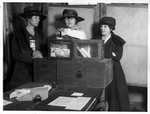
 |
Primary
Sources |
Finding Primary Sources on the Internet
Searching Techniques
- Use one of the Search Directories listed in this guide. It's often easier to browse through a list of sites someone else has selected and organized for you than to try to select the same words someone else will use in their web page. (For instance do you search for United States or America)
- If you have the title of a document or the name an event, enter that in quotes or in the search box that searches for a phrase. The same strategy is useful for an individual. Enter their name. However, it is sometimes useful to enter other keywords with a plus sign, to further define for whom you are looking. For example, +"George Washington" +president will produce websites on the American president and exclude sites on George Washington Carver, the African American scientist.
- Searching for concepts in primary sources is difficult. It's best to think of primary sources, even documents as artifacts, and search for that "object" and not for the concept it represents; For example search for +india and +(britain or british) but not "british imperialism or "japanese internment camps".
Issues and Questions
- Remember that an online collection is a selection, just like a library is a selection. You are not seeing every document, photograph, or other kind of primary source available. Despite the best intentions of historians and archivists, sometimes signficant pieces of collections are left out of online, digital collections. Money, time, and server space are also factors which make these online collections selective.
- The digital collection is only as accurate as the individuals who have scanned and put them on the web. Look for errors and mistakes in the sources to discern if they are "the real thing". (protocols of zion
Guides to Using and Evaluating Primary Sources
Sites With Assignments For Primary Sources
Selected Sites With and Collections of Primary Source Materials
Miami University Only Sources (access on campus or with your unique id/password)
for a more extensive list see the libraries web page, Research by Subject | Historical
Catalogs
See also:
History and the Internet: A Guide. By Patrick D. Reagan. Boston: McGraw-Hill,
2002.
Using Internet Primary Sources to Teach Critical Thinking Skills in History.
By Kathleen W. Craver. Westport, Conn.: Greenwood Press, 1999
back to main | rev 9/07jp
Image from Library of Congress, Prints and Photographs Division [reproduction number, LC-USZ62-75334], By Popular Demand: "Votes for Women" Suffrage Pictures collection, see: http://memory.loc.gov/ammem/vfwhtml/vfwhome.html